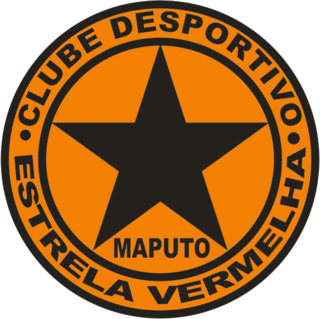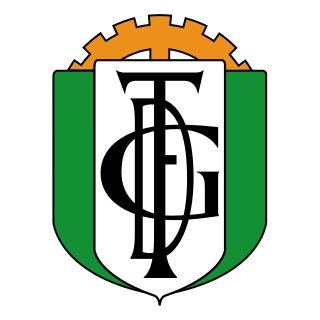
Portuguese Mozambique or Portuguese East Africa were the common terms by which Mozambique was designated during the period in which it was a Portuguese overseas province. Portuguese Mozambique originally constituted a string of Portuguese possessions along the south-east African coast, and later became a unified province, which now forms the Republic of Mozambique.

Mário Esteves Coluna was a Portuguese footballer who played mainly as a central midfielder.
Mário Wilson was a Portuguese football player and manager.

Clube Ferroviário de Maputo, or simply Ferroviário, is a Mozambique multi sports club from Maputo especially known for its football operations but also for its basketball and roller hockey team.
Clube de Desportos do Maxaquene, usually known simply as Maxaquene, is a sports club based in Maputo, Mozambique. The club is nicknamed Maxaca. Currently, besides football (soccer) there are two indoor sports, namely, basketball and handball. In such sports Maxaquene is the club with the most national titles after independence. Maxaquene won its first post-independence title in football, the Taça de Moçambique, in 1978. Prior to Mozambique's independence from Portugal in 1975, CD Maxaquene were known as Sporting Clube de Lourenço Marques or simply Sporting de Lourenço Marques, and was the branch number 6 of Lisbon-based Sporting Clube de Portugal. Under this name, both the legendary Eusébio and Hilário, played for the club.

Clube de Desportos da Costa do Sol, commonly known as Costa do Sol, is a Mozambican sports club based in Maputo. It is best known for the professional football team playing in Moçambola, the top division in Mozambican football.
Grupo Desportivo da Companha Têxtil do Punguè is a Mozambican football club based in Beira. They were relegated from the top division in Mozambican football, Moçambola, in 2014. Their home stadium is Estádio Chiveve.

The Clube Desportivo Estrela Vermelha, the Red Star Sports Club, is a sports club from Maputo, the capital of the south-east African state Mozambique. It was founded during the Portuguese colonial era on 4 October 1934 as Clube Desportivo Malhangalene, deriving its name from the historic quarter of the city.

Grupo Desportivo Fabril is a Portuguese sports club established as Grupo Desportivo CUF do Barreiro, with CUF standing for the company Companhia União Fabril. A multisports club best known for its football section, it was founded as a works team in the city of Barreiro, District of Setúbal, on 27 January 1937. CUF Barreiro's greatest achievement was a third place in the 1964–65 Portuguese Liga season. The club's football home ground is the Complexo Desportivo Alfredo da Silva, which was inaugurated in June 1965 and named after Alfredo da Silva, an entrepreneur who was the founder of CUF.
Ethnic Chinese in Mozambique once numbered around five thousand individuals, but their population fell significantly during the Mozambican Civil War. After the return of peace and the expansion of Sino-Mozambican economic cooperation, their numbers have been bolstered by new expatriates from the People's Republic of China.

The Portugal national roller hockey team is one of the most successful roller hockey teams of the world, along with Spain, Italy and Argentina.
Júlio Cernadas Pereira, commonly known as Juca, was a Portuguese football midfielder and coach. Most of his career was associated with Sporting CP, as both player and manager.

Eusébio da Silva Ferreira, nicknamed the "Black Panther", the "Black Pearl" or "O Rei", was a Portuguese footballer who played as a striker. He is considered one of the greatest players of all time as well as Benfica's best player ever. He was known for his speed, technique, athleticism and right-footed shot, making him a prolific goalscorer, accumulating 733 goals in 745 matches.
The Mozambican Roller Hockey Championship or Moçóquei is the top division of Mozambican Roller Hockey, and it is organized by the Mozambican Roller Sports Federation.
Rui de Gouveia Pinto Rodrigues was a Portuguese football player and manager. He played as a centre-back.
Augusto Matine was a Portuguese footballer and manager who played as a midfielder mostly for Benfica and Vitória de Setúbal at club level and nine times for the Portugal national team. Most notably, he managed the Mozambique national team.
The sport of football in the country of Mozambique is run by the Mozambican Football Federation. The association administers the national football team, as well as the national league. Football is the most popular sport in the country.
The District Championship of Lourenço Marques was a competition for association football clubs in the then officially Portuguese Province Mozambique and was held 40 times between 1922 ad 1961. Participants were the clubs of Lourenço Marques, today's Maputo, the capital of the country. Till the introduction of the national championship in 1956 this was the most important competition of Mozambique.

The Liga Moçambicana de Basquetebol (LMB), known as the Liga Mozal for sponsorship reasons, is the highest basketball league in Mozambique. Founded in 1960, the league typically consists of eight teams. The winners of the competition earn the right to play in the qualifying tournaments of the Basketball Africa League (BAL).

Clube de Desportos da Costa do Sol, commonly known as CD Costa do Sol, is a Mozambican basketball team from Maputo. It is the basketball section of the multi-sports club, founded in 1955.








